Unfounded optimism deprives you of useful urgency and footing on reality. Blind faith that “things will somehow get better” on their own is a vulnerability that makes you susceptible to manipulation. Unrealistic hope puts you in danger of flying too close to the sun. Boldly accepting your dire circumstances is your first step towards survival.
“False hopes are more dangerous than fears.”
- J. R. R. Tolkien
Wishful thinking is the cowardly act of burying your head in the sand, telling yourself that “things are going to work out,” without any evidence to support this delusion. So, when you are unreasonably hopeful, you don’t have to adapt, and you don’t cut your losses. You keep hanging on to pipedreams and hopeless pursuits, when you could be retreating to recuperate; to reevaluate your goals, your identity, and your place in a world that isn’t what you thought it was - a harsher world. False hope is a fantasy that renders you inactive as you rest back in deluded safety. It makes you docile, inert, satisfied, complacent - assured that some magical step-daddy is coming to your rescue (gay). This makes you harmless to your enemies, and manipulable to your exploiters. At best, you become addicted to toxic motivators and optimism grifters for your supply of generic meaningless hope.
Hope is a cope.
The burden of hope
You cultivate false hope when you are scared knowing you have something to lose. Whatever you have in your life, you value it so much that you can’t live without it. So, you feel compelled to “protect it” with imaginary optimism, because you can’t live with the idea of losing it. To sleep at night, you try to convince yourself that “things will have to work out,” without a plan of action, without a feasibility study, without evidence that things actually have a realistic chance at working out. This delusion makes you manipulable to professional suppliers of hope and toxic positivity, those who will quack the things you desperately need to hear, just to steer you wherever they want you to go. And so, you’ll follow these grifters through hellish lies, endless ordeals, and off cliffs, just to get your next dose of hopium.
The useful idiots who fell for the Jan6 trap held onto immense hope that “things would get better,” as long as they rested their faith on one sleazy orange billionaire whose snark lets him get away with lies and broken promises. So, they did exactly what he ordered them to do - to aimlessly march into the Capitol building - which got them arrested and persecuted… their lives destroyed. And the same guy who got them in trouble didn’t even have the decency to pardon any of them - he was too busy pardoning scummy rappers at the time.
False hope can make things even more hopeless for you.
False hope is a coping mechanism. It is an unrealistic obsessive belief in something that has no justification for you to rest your faith onto. You foster false hope because you are too scared to accept reality. Without accepting reality, however, there is almost no way that things will get better on their own, because you don’t control them, and you’re not clairvoyant.
Deluded hope is a rejection of your own agency in your life, and a blind belief in positive fatalism: “I don’t have to do anything because I somehow trust that the things outside of my control will magically get better without any intervention from my part. All I have to do is obsessively believe. I don’t have to do anything else.”
Hope makes you lazy. Hope makes you comfortable and complacent. Hope makes you cowardly, weak, and less of a threat to those who exploit you, because with hope, you have something to lose when they threaten you. Hope makes you manipulable to those offering the drug of desperately needed optimism, because you are too weak to be OK without it.
Too much faith in the gods or in imaginary divine providence, too much positivity in the universe - whatever you want to call this higher-power optimism - will render you complacent; too overconfident to lift a finger. The hare lost the race to the tortoise because the former was sure he’d win. The tortoise fostered no delusions, no hope that he’d win; but he did anyway. At least the hare had evidence to justify his confidence. Do we have any evidence at all to warrant hope for the future?
The dignity of hopelessness
Some say you have no choice but to maintain some hope, even false hope. But this is an admission of cowardice. It is a confession that we are too afraid and dishonest to admit reality as it is, even when it is demonstrably hopeless. It divulges an inability to accept and manage reality, so much that we have to delude ourselves with childish lies that make us even more vulnerable.
And what if false hope does help us achieve something? How meaningful would that something be if it were based on delusion?
Admitting hopelessness is not giving up, nor giving in. Quite the contrary: maintaining false-hope delusions is in fact giving up on yourself, because it means that you clearly don’t seem to believe you can be OK without hope, without expectation that your external environment can somehow improve.
Maintaining false hope is an admission that you can’t be OK with yourself unless your external environment (things you can’t control) improve. How weak is that? How little control over oneself does this imply?
Giving up false hope comes from a place of faith in yourself - faith that you’ll be fine as you are, without expecting things outside of your control to magically change in your favor. Giving up false hope is faith in yourself more than in external factors.
Rejecting hope is adapting your expectations to reality. The late-40s bachelor who dyes his hair, hangs out in night clubs, and tries to flirt with 20-year old girls, has hope that maybe he’ll meet a good young woman, and thus make all his wasted youth somehow meaningful. He does not understand that his false deluded hope is robbing him of his dignity. He doesn’t realize that by maintaining false hope, he proves that he is not on good terms with his reality. Sure, he could find someone 20 years younger, but the relationship won’t be ideal, if it lasts at all.
The 50-year old bimbo who dresses up like a teenager, is addicted to body modifications, and acts like a party girl for cheap fun and even cheaper male attention, has hope that maybe age is really “just a number,” and that maybe she can relive the arrogance and self-absorption of her youth. She doesn’t understand that this false hope is humiliating her, and it is turning her into a laughing stock. Her hope that “she can be young again” is costing her even more than she’s already lost.
The gambler has hope that this time he’ll win and make up for all his losses - hope in luck, which is beyond his control. The drug addict has hope that this dose will be the final one. The mercenary has hope that he’ll somehow survive the war, and that his retched blood-money will somehow find itself to his family’s bank account. All countries that start wars are hopeful that they’ll win. Passengers on the Titanic were hopeful that “everything would be OK,” even after the ship started flooding. I wonder how many passengers’ lives would have been saved had they instead rejected foolish hope, faced their reality, and acted early to maximize their chances of survival.
True hope: confidence
Indeed, you can argue that “hope” has been the precursor of great things, like engineering and technological innovation. You must have some positive expectation before you act towards a positive result. But true hope is always warranted, realistic, and incremental. True hope is really just confidence: trust in your proven abilities to excel, and to control well things that are actually in your control. Humans never had deluded hope to invent the car from scratch. They first had confidence to invent the wheel initially, and build on that proof of efficacy to base their confidence to invent the wheel barrel, then the cart, and so on.
So, hope is just a positive expectation of optimistic future results based on zero effort from you. Hope is just wishful thinking, a pleading to the supernatural, an expectation for the external environment to magically shift on its own in your favor, without you having to do anything. Hope is based on nothing other than “I want it to be so, therefore, I tell myself it will be so.” With hope, you are less likely to act, since the positive future you expect to happen does not rely on any of your input, since you can’t control it. With deluded hope, you lean back complacent and inert.
Confidence, one the other hand, is based on a realistic situational awareness. Confidence is no blind faith in “the universe,” but instead it is belief in yourself, your own abilities to thrive, or to escape a bad situation. Confidence is in things you can control. Confidence comes from historical proof of your efficacy. With confidence, you are more likely to act, since the positive future you expect to happen does indeed rely on your input.
Hope is optimistic faith in things outside of your control - so no effort is required from you, since you surrender all your being to things beyond your grasp.
Confidence in yourself is trust in your proven abilities to control the aspects of your environment you can control - so, with confidence instead of hope, you are more likely to act to seize control of whatever is within your power.
If you are to have confidence that drives you to excel, it must be based on reality. If your optimism for the future requires mental gymnastics, ridiculous rationalizations, childish fantasy, and blind faith in the supernatural to sustain it, then it is surely false hope and delusion.
However, if your hope is based on realism, proof of efficacy, and things that are realistically under your control, then true hope - or confidence - it is. Give yourself some credit for your ability to maintain confidence, and only confidence, without the desperate need for wishful-thinking false hope. This means you must first gain enough awareness to neither overestimate nor underestimate your abilities.
True hope is self-confidence. False hope is deluded unjustified belief in external factors beyond your control.
“O God, give us the serenity to accept what cannot be changed, the courage to change what can be changed, and the wisdom to know the one from the other.”
Serenity prayer
Deleterious hope
Hope is the enemy of confidence. When you force yourself to blindly believe that “things will get better” on their own without any of your input, or without any evidence that they will get better, you tell your subconscious that you are powerless to do anything about your situation: nothing is under your control, so there’s no need for you to do anything. Granted, sometimes, this may be true: there may be nothing realistic that you can do to improve your situation. But making peace with your harsh reality is more dignified than making up fairy tales.
The worst part of fostering false hope to cope with your dire circumstance is that you admit to your subconscious that you are too cowardly and weak to accept reality, and that you therefore rely on childish fairy tales and wishful thinking to make your existence bearable. This gives you the self-image of a hopeless powerless person, an individual with compromised self-esteem, little dignity, and even less integrity. You suffer from cognitive dissonance, as your comfort from false hope clashes with your depression from knowing subconsciously that you are weak to desperately need false hope. Mindless hope will make you insane.
Believing falsehoods is psychopathy.
Hopeless hope
False hope is deluded self-assuredness; it is crippling overconfidence in the external, enough that you don’t see a reason to do anything yourself. If everything is going to work out, why bother acting?
Remember that episode from Blackadder when Edmund was tried for the murder of a military messenger pigeon, and was sentenced to be executed? His loyal friends tried to think of ways to get him off the hook. When George remembered that his influential uncle could pull strings, and actually pardon Edmund, what did they do? Instead of having urgency to actually seize the opportunity, their excitement and joy and hope took the better of them; they partied all night, got wasted, and forgot to call the uncle. They missed the execution day. Lucky for them, the execution was cancelled by other means…
Hope is a blinder that denies you the acknowledgement of the truth. Hope shows you only want your frightened inner child bears to see, and also make up fairy tales for that child. Children love fairy tales.
Hope is willful blindness to hopeless truth.
Hope breeds apathy from deluded comfort. Hope curses you with the affliction of tolerance of what you should not tolerate, simply because you delude yourself that things will somehow get better on their own. When you don’t feed such delusions, you know things won’t get better on their own, so you are less likely to tolerate being mistreated.
You allow your oppression only when you expect to be better off complying. So, if you hope and expect the future to get better regardless of your input, then there is no need to take risks by resisting - you presume your oppression will end on its own anyway.
Hopeful comfort makes you harmless to your oppressors. You only need look at the Soviet ‘Operation Trust’ and the recent ‘Qanon’ nonsense: both government counter-intelligence operations that instilled false hope in aggrieved populations to keep them from revolting. False hope messaging included unfounded delusions that “the good guys were in control” and that it was “game over” for the bad guys - or that “martial law” was a good thing because it meant that “bad guys were being arrested,” and that freedom is coming any day now - it’s JUST around the corner.
No evidence required - schizophrenic hope was enough for the hopelessly weak to believe in nonsense… only because they are never strong enough to admit the harsh truth that no one is coming to save them.
Refusing hope
It takes courage to choose to reject blind delusional unrealistic hope. It is brave to admit that the world is on fire, because then you have to face it, rather than cowardly blind yourself to it. And that’s what hope boils down to: cowardly willing blindness to harsh reality. It takes a bold individual to admit that possibilities are always against him, and that he stands absolutely no chance at winning at gambling (life is one huge casino, anyway). It is statistically impossible to ever win as a gambler (in life we all lose eventually). Yes, you might “win” a game or two that only encourage you to keep playing, so that you lose even more in the long-run. Statistical facts are undeniable - hoping that “you’ll win” against the wind is just retarded and cowardly.
Take, for example, the blind hope that people have in “their guy” during each (s)election cycle. “But my guy did a better job last time…” Did he, though? Or did the system just throw you a bone, a limited hangout to keep you believing in it? Did your oppressor just loosen the collar only a little bit so that you love him when he’s not flogging you?
With his sporadic acts of kindness, doesn’t your oppressor tighten his grip on your due to your newly acquired Stockholm-syndrome masochistic love for him? Pathetic.
Hopeful slaves are obedient slaves. Hopeful people are harmless people. Hope is a problem… we need less of it.
Look around you: it’s the hopeful, the people who always presume that “things will work out on their own” - without any effort required from them - that tend to be stuck where there are. It’s the people who are over-positive enough to “see themselves somehow succeeding in the future,” but have no plan to get there. Since they are hopeful for things outside of their control to magically improve, they see no need for a plan of their action. It makes me wonder what the true intentions of the merchants of hope are: to motivate you, or to keep you down?
When you are hopeful, you lack urgency, so you feel no need to lift a finger to do anything. Yes, you have to have confidence in your ability to succeed, otherwise you won’t act, but this is not hope. Confidence is trust in your abilities in a certain field, and it is founded on real-life historical evidence. Hope is unfounded. Hope is childish wishful thinking. Hope is cowardice.
Hope is a delusion. The euphonious mantra “never lose hope” has infested popular culture with unrealistic expectations and undeserved entitlements that dump their victims in a grave of apathy, complacency, and inertia. Hope is toxic.
Hope in the state
Religious hope in the system of government is why we keep getting more and more government overreach, more and more government powers, more and more government corruption. The fact that people keep voting means they still have some hope that the system will somehow work in their favour, as long as they vote in the right guy. They still hope that the system will somehow fix the system. Notice how, in their mindset, all they need to do is cast a vote and cross their fingers - they hope that things outside of their control will improve on their own, without any effort on their part. This is what hope is: laziness and lack of self-accountability.
The hope of voters blinds them from the brutal fact that no good people will ever be allowed by the system to run for office. And if, by a miracle, a saint runs for office, and somehow manages to out-PR the big sharks of politics enough to get noticed, then there is no way he will not be corrupted, or threatened into submission… or assassinated on live TV like JFK (a stern warning for all “leaders” who dare go off-script).
It is precisely this hope in the system that keeps the system alive, like a self-fulfilling placebo delusion - you believe government is legitimate, so it becomes legitimate through your hope in and compliance to it. If enough people lost hope in the system, then the system would peacefully implode and collapse like the Soviet Union, when the Soviet state issued orders that no one followed. The problem was that people lost their faith only in one brand of government, and transferred that hope into another brand of government (which made things even worse for ex-Soviet countries in the 90s - except for the new oligarchs).
People need to lose all hope in government, and transfer that hope into voluntary systems of self-governance. If a threat-based state can exist only due to hope in it, then statelessness will surely become sustainable and thriving when enough people rest their hope on it instead - or better yet, their confidence in it (self-governance is up to us, not some liar politician).
Rejecting hope
Losing hope makes you angry. Hopelessness makes you dangerous, because without hope, you have nothing to lose. With nothing to lose, you suffer no indignities, take no shit from the people who took hope from you. Hope doesn’t turn you into a relentless fighter; hopelessness does. When you have hope, hope is something precious you’re afraid to lose. Without hope, you become a dangerous cornered beast.
It’s only those unafraid to lose that win - because what is there to lose anyway? In finance, it’s the people who can afford to lose an investment that win. They don’t delude themselves with hope that “they’ll win.” They understand the hopeless odds, but play them anyway. If you invest all you have, without being OK to lose that investment, then your fear and desperation will likely lead you to spastic uncalculating moves, and therefore, to failure. It’s people who don’t understand the odds that lose bigtime.
It’s those with deluded hope that play losing games.
In your personal life, if you can’t possibly handle rejection, that’s because you hope that things will be OK, and you’re not prepared to manage rejection bravely. But this is why you will definitely be rejected: your desperation reeks of unattractiveness.
If you don’t care - meaning, you are fine without being hopeful - you’ll project a regal indifference that actually makes you attractive, and more likely succeed. And if you’re still rejected, it doesn’t bother you.
In war, it’s the soldier unafraid to die that is more likely to fight well, and more likely to survive. The guy hoping to live through the trench charge will be spastic, hesitant, overwhelmed, and so he won’t make it. The armies with little regard for the lives of their soldiers tend to win the wars; they don’t hope to get everyone back alive.
Admittedly, constant unfocused anger (from the lack of hope) may also make you manipulable to demagogues who can direct that anger for you. But you only fall for demagogues if you place your hope in them. So, if you are angry, be suspicious of those selling you hope to calm you down.
You need to lose hopefulness. You need to let go of unjustified hope. Let go. It’s not edgy or cool to wait for Santa to bring you gifts; it’s retarded. Give up on childish wishful thinking, and realize that you have nothing, and you are nothing. Only then might you become worthy of something - maybe.
Only by being OK with failure might you deserve success.
Hope is an inability to accept defeat. Losing hope is a strategic retreat. Step back, accept your failures, cut your losses… but don’t delude yourself with unfounded unrealistic hope like a maggot on speed.
I make a point of this in the epilogue of Why the West is NGMI [Part 1]:
There is optimism in burying a dead horse, instead of hopelessly beating it, hopelessly hoping it’ll rise again. Who knows - when you give up on dead horses, perhaps only then will you finally realize what you’ve lost. It is more dignified to give up on foolish hope that drains you of your self-respect. Deluded hope is simply pathetic, undignified. And who knows - with self-respect may come empowerment. With the dignified acceptance of your doom may come self-accountability in seeing where we were responsible - and thus in control - of our fate; and therefore, where you have the power to change it. Only then can you seek to resurrect your culture, or out of its ashes, make another one, a better one.
We must give up false hope…
Maybe you need to first give up completely if you can ever hope to recoup, put your pieces together, and begin anew with fresh motivation, a rekindled spirit - and perhaps new strategies. Because, if you cling on to false hope that the dead horse will somehow resurrect, you’ll never figure out how to make a tractor instead. Maybe we need to reach the bottom before we can kick back up. Floating in mid-water gets you nowhere.
You don’t deserve hope
When you hope for something good, ask yourself if you deserve it. Chances are you don’t. You keep on hoping for good stuff, but did you earn it? Did you make yourself worthy of it first before you began wanting it? And this is why you’ll never get what you hope for: you are already entitled to it, so you won’t do anything to warrant it.
When I say that “you don’t deserve what you want,” I am not being negative or abusive; quite the contrary. I am telling you that you shouldn’t want things you don’t deserve. But if you still insist on wanting them, then you need to make the effort to deserve them. Once you make the effort to deserve them, then that’s the only chance you’ll have at actually EARNING what you want, instead of hoping to randomly get it out of luck, or divine intervention.
See? The only way to have realistic hope for something better is by rejecting all unrealistic hope. The only way is by understanding that you have no right to want something better, because you don’t deserve it - you never earned it. Once you admit this, you then don’t have the audacity to hope for what you don’t deserve. You stop hoping for things to get better on their own, so you either accept your harsh reality, or you work to change the things within your control - so that you can earn and deserve better things. This attitude is more likely to get you better results than childishly hoping that “things will get better” on their own for… reasons.
There is hope in hopelessness.
Just because you want something good doesn’t mean you deserve it. If you’re entitled to good things, you don’t see the need to earn them. If you don’t feel entitled to good things, you are more likely to work to make yourself worthy of them - and thus more likely to get them. Humility is empowering.
The power of abandoning hope
Giving up hope is self-accountability because it requires your acknowledgment that you are not entitled to hope - you just don’t deserve better… yet. Why? Because you are complicit in your tolerance of whatever is plaguing you. What did you think? That you could simply have the gall to hope for things you hadn’t yet worked towards, hadn’t earned, hadn’t become worthy of?
When you maintain such deluded entitlement, you assume you are already entitled to get what you want, so there is no motivation to work towards it. Instead, if you had the humility to accept that you were yet unworthy of the things you wanted, then you’d have the drive to earn them by making yourself worthy of them - if that’s even possible.
Thus, your deluded hope is proof of your complacent complicity in your dire circumstance. By simply having the audacity to hope for the unearned and undeserved, you remain unworthy of whatever you hope to get. Your hope makes you presume you are acting towards something, but you aren’t - not really. People passively hoping are people who don’t act.
Hope is expecting a good result without necessarily earning or deserving it. This mere hubris of hope is proof that you don’t deserve to be hopeful, nor do you deserve to get what you so arrogantly hope for. Your entitlement to the whole universe shifting in your favour is telling…
Once you humbly abandon your entitlement to hope, this is when you see your full complicity in your circumstances, and therefore, you become aware of your power to change things.
If you take some responsibility for your problems, that’s because you have the power to solve them.
Abandoning hope frees you from your entitlement to something unearned. So, now you gain the understanding that, if you want something, you must first deserve it by acting towards it, and thus earning it. If you are not entitled to something, then you are more likely to act towards earning it - as long as you want it without feeling entitled to it. And this is the only hope you have to ever getting it. Don’t you see? Abandoning hope is the most hopeful thing you can do.
“A little less hope, a little more action, please.”
Elvis Presley (maybe)
The debilitation of hope
Your hope can be the thing dragging you backwards.
Deluded unfounded hope is naive optimism and deluded positivity, which keep you down. The Soviet state’s ‘Operation Trust’ did exactly that: it kept people from revolting against communism, by feeding them false hope that things would get better on their own, any day now. The US regime’s ‘Qanon’ psyop did the same up until 2020: when the lockdowns were introduced, they quelled and divided dissenting voices by mudding the water, and by giving false hope: they literally spread the lie that “martial law is good” because supposedly “the pedos are being arrested” by the imaginary “white hats” - and thus COVID lockdowns were good, because they were a cover to keep the people safe. How hope-manipulation was used to quell resistance…
The Qanon psyop used people’s naive hope against them. Despair, at the time, would have been more empowering. Despair would have spared them the manipulation and misdirection. Despair would have also made them more dangerous, with less to lose.
Another example of hope debilitation is the “sovereign citizen” nonsense that gives gullible idiots the hope that, if they memorize a few imaginary “laws of the sea” (or some other meaningless legalese), and then quote them back to any government enforcer, then they won’t ever again have to pay taxes or face government violence. They fall for this scam, paying good money to listen to grifters bullshit them, because they foster desperate hope that things will turn out good. Then they get themselves in trouble with the government for foolishly thinking they could defy its monopoly on violence. So, they painfully come to realize that the whole “sovereign citizen” grift was nothing but yet another scam based on hope - no different from the Nigerian prince scam.
But they don’t learn from their experience: they jump on to the next scam, for example, the flat earth. Oh, what deluded hope does the flat earth grant...! that there are somehow other continents and beings beyond the “great ice wall of Antarctica” surrounding this “disc-world,” and that those beings will somehow save us from ourselves… one day soon, just about, any day now. There is no more debilitating thing than the naive “any day now” anticipation of a deus ex machina.
See now how false hope can be pessimistic and hopeless? See how losing hope becomes optimistic when it frees your mind from debilitating delusions? The man who foolishly imagines that everything will go well, whatever he does, won’t do anything for himself. This “it’ll be alright” toxic-positivity mantra actually promotes the notion that, regardless of how much or little you work, things will be OK. So, how does that motivate you to work to improve anything? Hope keeps you down…
Toxic false hope deprives you of the urgency, the hunger, the angst, the despair… the thymos, pathos, and polemos you need to break chains, burn bridges, and slaughter dragons.
Displacing hope
You need to lose hope… You need to realize that things are bad, and they’ll probably remain bad, even if you do work hard. But, if there’s a chance for things to get better, then that will only come through your efforts. To put in the effort, though, you must discard all hope that things outside of your control will improve on their own. Otherwise, your hope for the universe to shift in your favor keeps you complacent and inert - there’s no point to work when you imagine that things will be magically brought to you.
Waiting for Santa Claus is childish and undignified for an adult. Adults understand their harsh reality, and don’t willingly delude themselves with insane wishful thinking that is based on nothing but unhinged feelings. Losing false hope is dignified, because it’s a bold admission of reality, and a humble one at that. The only true “hope” you can have is actual confidence, or trust in yourself - but only in the things you can control, if you have proof of your efficacy.
Hope in romantic relationships
Hope is also debilitating in your personal life. If you just hope that “the one” will magically drop in, you waste your very short youth in meaningless situationships that “keep you warm” until “the one” arrives. What’s worse is that, hoping for the ideal partner means that you presume you deserve the ideal partner. Do you? Out of the few good people out there, do you think you are worthy of one of them? If you do, then you don’t feel the need to improve yourself, to be better, to safeguard your youth and innocence for the ideal partner. And if you aren’t ideal yourself, then you’ll never get an ideal partner. If you aren’t ideal, then your partner, just by being with you, proves he/she isn’t ideal.
You have to abandon all hope if you can ever have hope to meet someone. You have to give up looking to have a shot at maybe finding someone. Why? Because when you are optimistic, it means you expect an entitlement, which makes you frustrated and desperate the longer you don’t get what you demand. When you desperately look for something, it never shows up. When you’re relaxed and self-reliant, it’s more likely to come.
When you lose hope - let go of your delusion that you are somehow owed things you want - then maybe, in your self-reliance without what you want, you might become worthy of it.
The doomer mentality
I reject the lazy accusation of supposedly being black-pilled or being a pessimistic doomer who just gives up and wallows in self-pity. This is a straw-man representation of what I’m saying. Hanging on to imaginary false hope is even worse than giving up. In fact, unfounded hope is the real giving up, because it means giving up on reality and your own trust in your sanity.
Letting go of fairy tales is not giving up on yourself. It’s actually regarding yourself. Discarding hope in things beyond your control is actually trust in yourself to affect the things that are indeed under your control, as few and insignificant as they may be. If you can’t control anything external, then discarding hope is at least trust in your ability to manage not being in control of anything.
Indeed, some people indulge in the comforting identity of being a sad loser, an underdog who can’t get a break, a victim who can’t ever get ahead. Some people do seek victimhood privilege and indulgence in self-loathing. But this is not my case. I don’t glorify negativity. I point out the reversal of negativity: toxic positivity and false hope. Negativity and false hope are two sides of the same debilitating coin. Hopeless despair is the same as false hope; you need to be desperate before you can convince yourself of optimistic falsehoods.
Sorry, just “believing” is not enough for the critical mind. Instead of hoping for things outside your control to improve, you can focus on improving yourself. Focusing on what you can control increases your confidence in your ability to manage your life, even though you can’t improve things outside your control.
The bottom line - self-reliance
Hopeless people can’t live without hope - so they fantasize about hope, and put it in some politician, ideology, deity, or cult leader billionaire. They lose their dignity, critical thinking, self-ownership, and survival instinct on the altar of comforting false hope. This is an admission of hopeless weakness. They can’t manage a life without external providence, so they imagine one that’s always in the future, always coming, always just around the corner that keeps moving, just out of reach. In their hopeful delusions, they lose situational awareness. They become manipulable, bereft of judgement and dignity. They are too cowardly to accept their harsh reality, so they make up fairy tales and Santa Clauses to bring comfort to their weak-willed hearts. But believing in fantasy is self-debilitating.
True self-reliance (perhaps the ultimate masculine trait) lies in your ability to live without hope, without delusional expectations for imaginary things that are unfounded, and unearned. Self-reliance means being fine with who you are - and the things you have - even when your external environment is hopeless. Because the more hope you place in your external environment, the less hope you place in yourself. And the more misplaced hope you have in things outside of your control, the more you tell your subconscious that you are incapable of managing your harsh reality. Then you’ll wonder why you have low self-esteem. Deluded hope erodes your self-regard.
You must get rid of false hope, otherwise you will be stuck hopelessly hoping, with arms raised to the sky, docile, inert, cowardly waiting for Athena to save you without the initiative to do something yourself. What can you do? You can start by discarding all your hope and faith in hostile environments, and in systems of perceived “authority” that prove time and time again that they hate you. Lose hope, get angry, be recalcitrant in your reluctant compliance to state violence. When you have to comply to the threat of superior violence, do so unwillingly and borderline disobediently, enough that you publicly challenge the faux legitimacy of those who oppress you (e.g. the gang of the state).
Be so difficult in your submission that it become less attractive for your oppressors to submit you.
Show to others, tell them that there is no hope in government, nor in organized religion (same thing), and it’s time to grow up and abandon childish wishful thinking. For humanity to mature, we must finally outgrow our deluded need in parent-figure belief systems.
Only at the end of hope can you stand a chance. Hopelessness allows you to adapt to your actual circumstances, and accept reality as it is. Survival is about acceptance of harsh truth, not the perpetuation of auspicious fairy tales that skew your perception of reality, and thus render you incapable of responding accurately to real-world demands.
Indeed, sometimes, false hope can work as a fake-it-’till-you-make-it dynamic, a self-fulfilling prophecy whereby your positive delusion creates false positive impressions that are the catalyst to your success - a sort-of placebo effect. Other times, your deluded optimism may lower your natural and justified inhibitions, so that you take risky action that just happens to turn out positive. But that doesn’t mean it works every time for everyone. Yes, some people sometimes do win at the casino; this doesn’t mean that gambling is a viable strategy, because statistically, in gambling you always lose, even when you sometimes win. Gambling is always a losing game. Gambling is what happens to people who foster false hope.
Ignoring the harsh reality of your hostile environment in the hopes of “faking it ‘till you make it” renders you vulnerable, as an ostrich hiding his head in the sand, hoping the predators will leave - it’s a wonder how that species survives.
Blind optimism is the consolation that gives you encouragement to endure, when oftentimes, you need to stop enduring, and stop tolerating. Sometimes, you need to get fed up with your circumstances, if you are to stop tolerating them, and actually act to improve them.
Hope makes you tolerant of things you shouldn’t tolerate.
Sometimes, you need less encouragement, and more pessimism; less hope and more despair. Sometimes, you need to be cornered, without any options, without any way out other than fighting through. There is nothing more dangerous than a cornered beast with nothing to lose, with no delusionary hope that “things will get better.” Because, if the beast imagined that walls would one day magically disappear behind him, he would not fight at all. This is what hope does to you - it deprives you of your cornered-beast power.
Nothing makes you more powerful than discarding all hope in your environment, thus having no option other than fighting through, rather than waiting for divine intervention.
Losing hope is not surrender. Losing hope is acceptance of reality. If reality becomes unbearable, then you begin to think about ways to improve it. But you only think of ways to improve a bad situation once you understand that there is no externally sourced hope for it to improve on its own. Abandon wishful thinking; your only hope rests in hopelessness.
Instead of holding on to baseless hope for the future, try to achieve warranted confidence in yourself.
“Harsh reality is always better than false hope.”
- Julian Fellowes
“False hope is worse than despair.”
- Jonathan Kozol
“False hope is sometimes much worse and sometimes much better than no hope.”
- Mike Caro
“What unhappy beings men are! They constantly waver between false hopes and silly fears, and instead of relying on reason they create monsters to frighten themselves with, and phantoms which lead them astray.”
- Baron de Montesquieu
Useful reading:
The Corbett Report - A brief history of hopium
Thank you for reading.
All of my work is free. You don’t have to pay me anything.
Follow, comment, share, subscribe for free… or not. It’s all the same to me.
My target audience is people who haven’t been born yet.
Don’t have time to read my lengthy posts? No problem.
Get the Substack app, and let it read them out loud for you while you commute, work out, or attend a pointless office meeting.






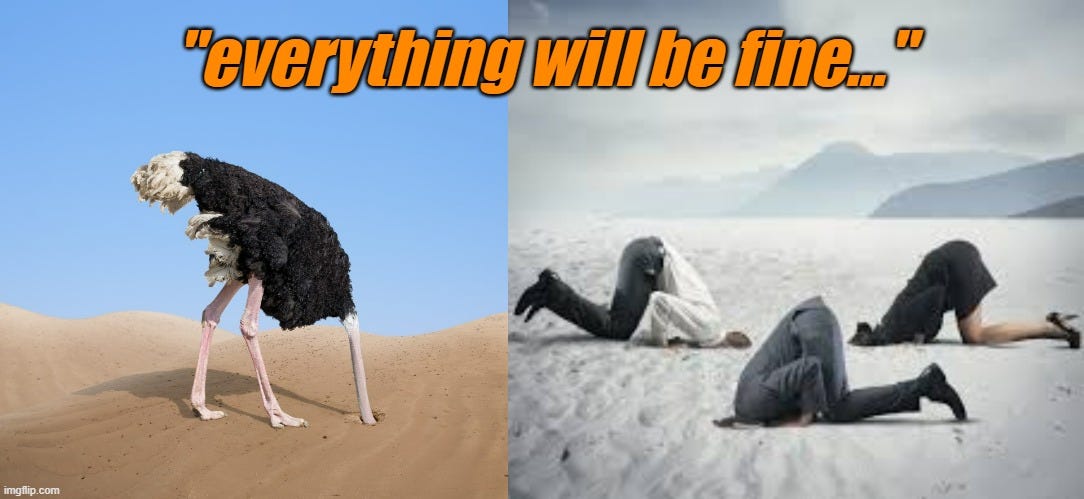

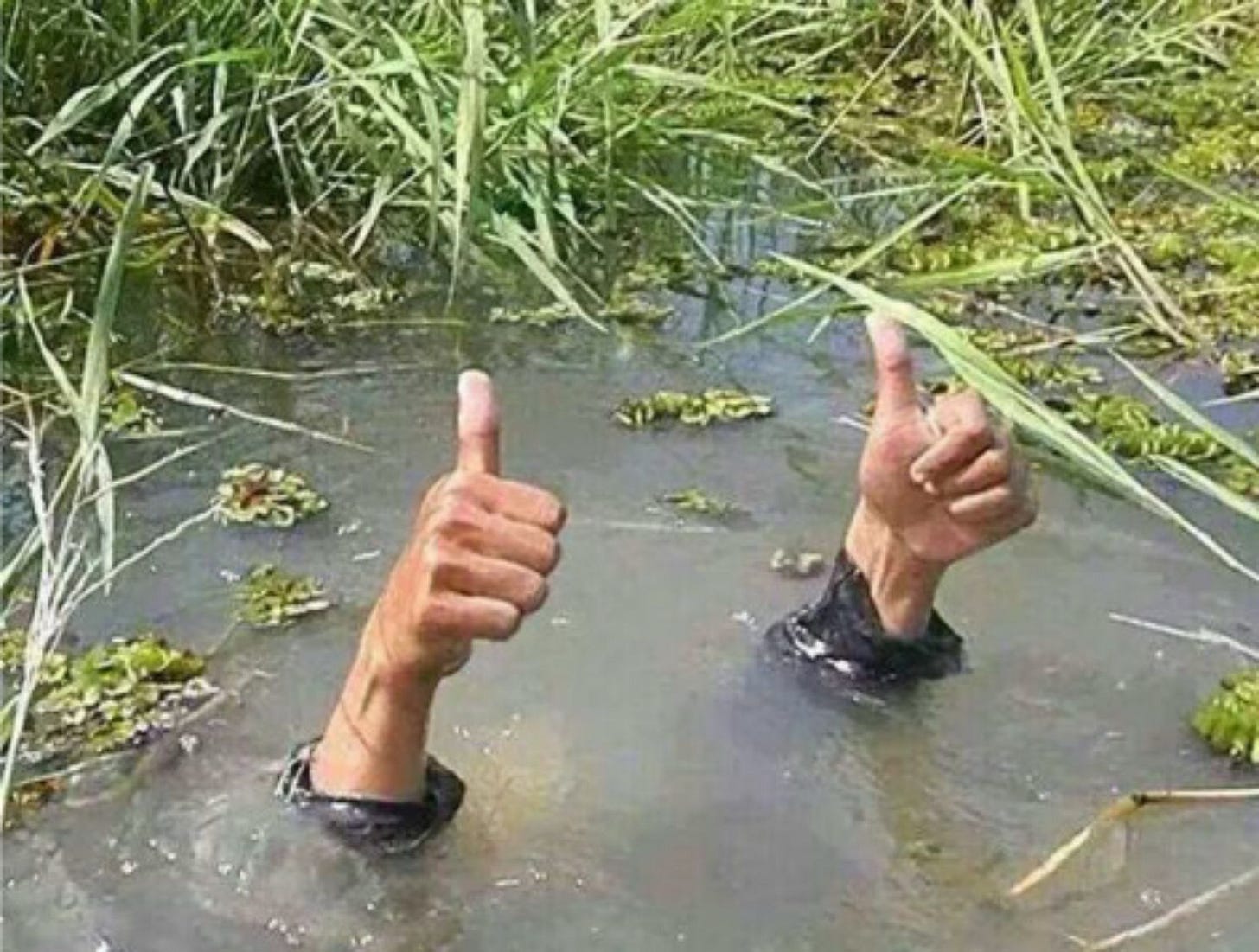

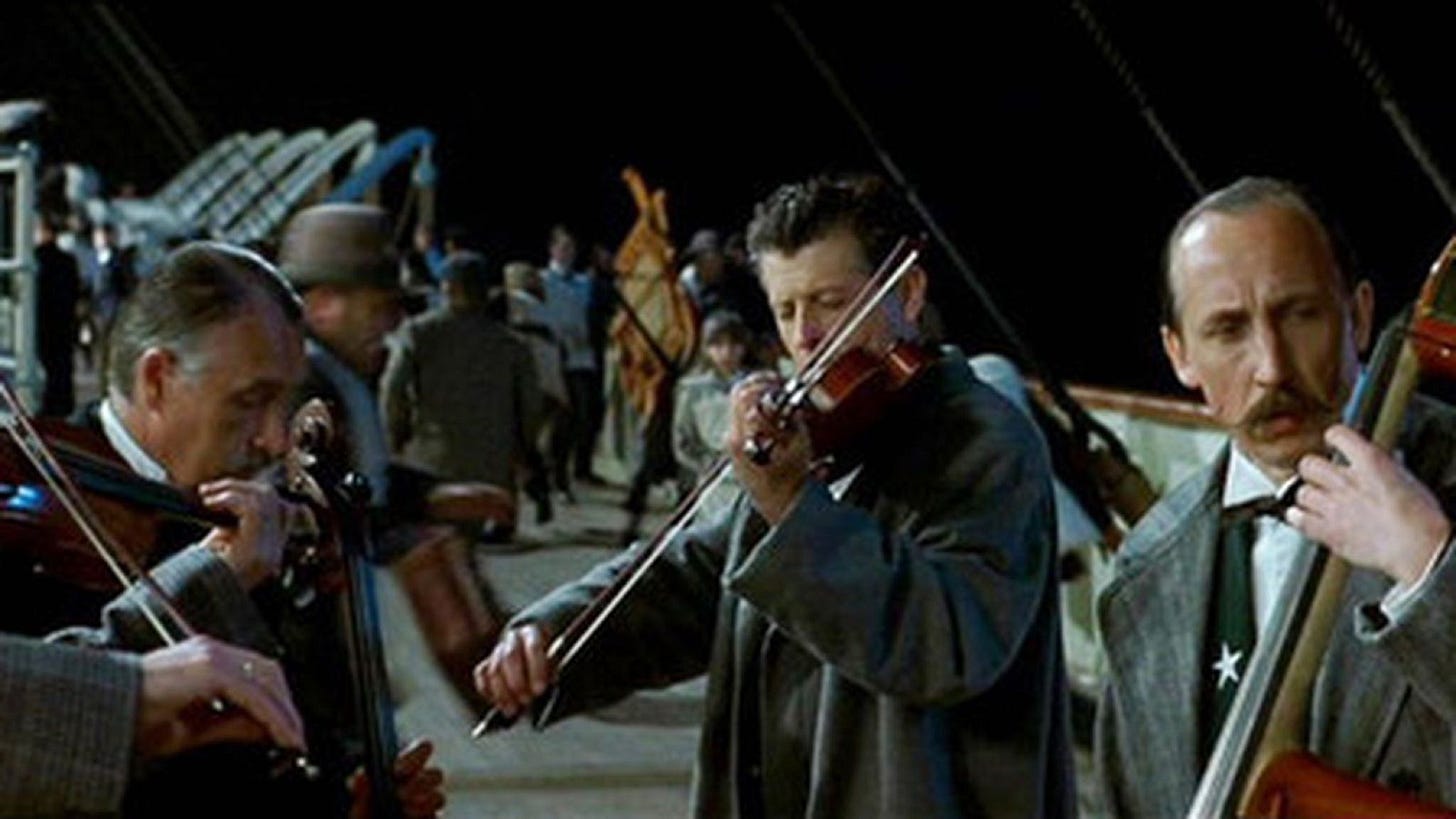

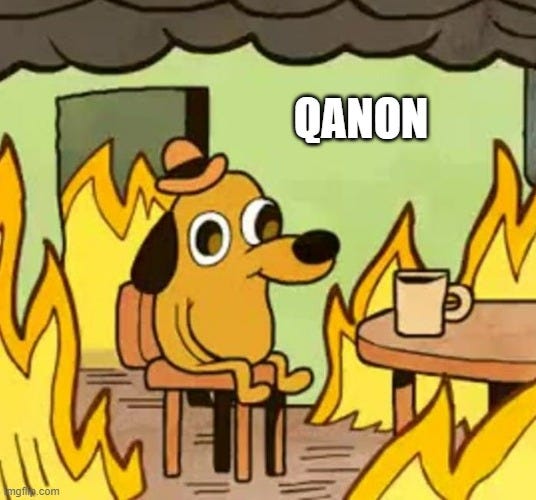
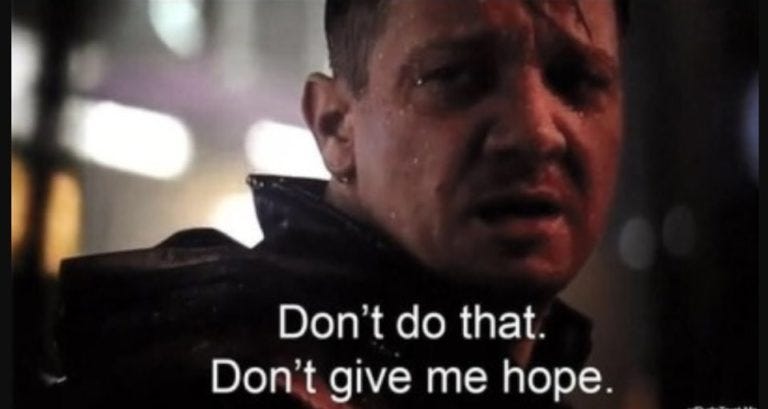



I enjoyed reading this well-written masterpiece. A little dark but I prefer the cold brutal truths rather than living in delusions. Thank you.
Thank you for this write.
It is kinda deep, i call my self an anarchist because i have come to much of the same conclusion, government is one major problem. And alot of what you write makes sense to how people act as they do, i often make the mistake to think people realise the same thing as i do...
It is an important aspect. Thank you.
I also have tried to use countless hours trying to tell people about what our governments are doing, when i exactly was hoping that people would somehow join and help regain freedoms, when i maybe should have used the time working on my self sufficiency on the homestead, developing tech that would make my life more cut off from the powers that want to destroy us.